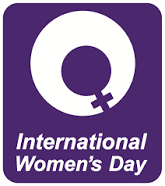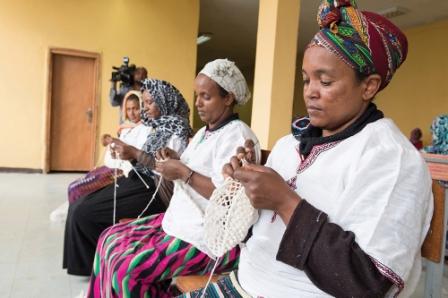Gender Equality
Men and women are indeed equal. When discussing the controversial topic of gender equality we would do well to understand each other before making our decision on gender superiority. Why is it that many people believed women are inferior to men? Why it is so many believe men should work while the women stay at home with the children? (Photo: Nanette Thomas, APC Texas President)
One of the main reasons is tradition. A vast majority of us have simply been raised to believe men work while women stay home to care for the home and family. Men should get educated for the specific purpose of going out into the world to make their family fortune, and women should stay inside with the kids; why is that? We’ve been raised to believe men do the working. Even now in the new millennium if you hear of a man taking the role as homemaker and the wife earning the salary we may unconsciously critique them. For some unknown reason we just consider that to be wrong. We have made great strides to correct our earlier beliefs that women are incapable of surviving alone and need to be taken care of. Some households try hard to instill the beliefs that we are all equal; however there still are pretend kitchens and vacuums all over the world preparing our young women to take on the roles of the domestic workforce. How are we teaching our children that we are all equal, and at the same time teaching them that women like to clean and cook?
Another reason we tend to fall into these roles of the traditional men work and women stay home cultures may just be competence. Just for fun imagine an entire society of children being raised by men. Absolute chaos, dirty clothes, messy tangled hair; everyone’s child would instantly turn into the “dirty” kid. As funny as it sounds mothers around the country would nod their heads in agreement at that statement. Simply put women may just be able to handle stress better; therefore; are being forced into the role of housewife as their superior counterparts would more likely crumble under the task. Just because women may be better suited at home than men does not mean they are best suited at home.
As we well know women are completely capable of attaining the same level of intelligence and education as their male counterparts. Though women may not be able to carry hundred pound bricks of concrete on their backs all day; men are generally equally incapable of bearing the responsibilities of child raising. Another reason and possibly the most accurate reason are instinct. After nine months of child bearing then painful delivery it’s not surprising that women would have such a strong bond to their children; they just don’t trust anyone else to do the child raising. In effect it’s only natural they would feel more inclined to be a greater part of their child’s developmental process.
To move from the subject of home and work performance let’s talk about mental comparison. Most men would have trouble remembering what they ate for dinner last night while a woman might remember the birth dates of every person they’ve ever met. I have so many male friends that rely on me to remember them when their wives birthday is approaching.Â
Women tend to pay much more attention to detail, as men tend to not pay much attention to the little things. Throughout the life course a typical man might master one or two special highly developed skills learned through strict direction, and a woman may be able to complete any task with less direction but with more unconventional methods. Actually it’s surprising to see so few women in leadership positions, as they tend to be such good problem solvers. Men are blunt, strong, and merciless, while women are creative, gentle, and forgiving. All the greatest love poems boast of how it takes one of each gender to form a complete creation. Somewhat like a puzzle; each piece possessing what the other is lacking. Only by utilizing each other’s strong points can a perfect harmony be achieved. Each has strengths and weaknesses the other does not, and by fitting those strengths and weaknesses together you complete the balance and finish the puzzle.
“I am strong, I am invincible, I am woman.”
These were the words uttered by the influential Australian singer/ songwriter Helen Reddy in 1972. Although over 30 years old, this song’s lyrics raise imperative issues about women’s right and about the capacity and ability of women to excel. Helen Reddy, I am sorry to break this to you, but achieving gender equality is not as simple as women all over knowing that they are ‘strong”, that they are ‘invincible’ or that they are in fact ‘women’ because our views don’t necessarily reflect the views of the rest of society. The ideals of this particular song have yet to have a significant effect on the global society; men and women still not having attained equality and women being generally disadvantaged in most aspects of society.
If only it was this simple. If only one person had the ability to change the way humanity thinks; if only one person could write a song that had the power to abolish gender inequality forever. If only.
Unfortunately for us, nothing in life is this simple, particularly the achievement of equality. It is very well known that since the beginning of time, women have been fighting for equality because, let’s face it, the systematic oppression of women all over the world is a noticeable and tragic fact of history. I personally believe that the denial of equality to one-half of the world’s population is an offence to human dignity. On no grounds can inequality on any kind be justified.
A widespread and common form of discrimination against women, used as a mechanism of defence, security and power, is violence as it crosses the boundaries of wealth, race and culture. It deprives women of their liberties as human beings. Recently, in 2002, Amina Lawal, a Nigerian woman was sentenced to death by stoning. What was her crime? Confessing to a pregnancy out of wedlock, and while under the Nigerian law it constitutes for any Muslim woman to be convicted of adultery, why subject only the females, or for that matter, why enforce it at all while there is no retribution in other parts of the world. What about the men folks? Don’t they have children out of wedlock?
Compared to our parents, and their parents, most of us hardly ever encounter the idea of gender discrimination. While it could just be my isolated opinion, it seems to me that women today don’t feel constrained to do certain jobs, or stay at home having children. The days where women were simply secretaries, kindergarten teachers, or housewives seem to be distant memory to most of us today, and while we cannot say gender discrimination is entirely gone, it is vastly decreased. Today, the Chief Justice in Sierra Leone is a woman; the Electoral Commissioner is a woman. Today I want to appeal to all the Sierra Leonean women to come out of the kitchen and make their voices heard. We need more women parliamentarians, more women Ministers, we need more women politicians, more women in the likes of Chief Justice Umu Jalloh and Dr. Christian Thorpe. As I write this article I cannot hold my tears back for the Late Mrs. Makalay Koroma (Nee Kamara). A dynamic politician and a leader who would always say “Are born APC are go die APCâ€.   The APC party has lost a great woman. To all the APC women in particular and to the Sierra Leone women in general you nar leh we osh. May her soul rest in perfect peace.
Women are afraid to be involved for fear that they would be embarrassed, and cursed out. Let me hasten to say that the only way you can make your voices heard, and stop seating on the fence is to come out of the kitchen and get involved.Â
Women have been disadvantaged also by gender biases in education which has had a huge effect on the male and females, in terms of employability and future ambitions. Looking at this issue on a global scale the impact is greater on females than on males in most contexts. There is little denying the fact that investing in human capital is one of the most effective means of reducing poverty and encouraging sustainable development. Yet, women in developing countries usually receive less education than men. More so, women in general enjoy far less employment opportunities than men the world over. Any claims and efforts then, to remove poverty, can show results only if they address the issue of gender inequality. Sharma (2000) writing about gender bias and education says: is by getting involved.  Â
“Education is widely recognized as the gateway to economic security and opportunity- particularly for girls and women but world figures in literacy relate a sorry tale. Of the 130 million 6-11 year-old children not in school – a majority – 60 percent are girls. The figures only go to show how in most regions of the world, specially the developing societies, gender bias impinges on girls’ education. Girls’ lack of access to education isn’t always related to scarcity of places in schools. It also emerges from expectations, attitudes and biases in communities and families. Economic costs, social traditions, and religious and cultural beliefs limit girls’ educational opportunities. Whatever the underlying reason(s), having large number of girls outside the formal schooling system brings developmental challenges to both current and future generations. Individuals, families, communities and nations are affected. Inability to read, write and calculate complicates a girl’s efforts to engage in both market-focused production and household activities as effectively and efficiently possible. This affects her family’s welfare and diminishes her potential contribution to the development of the household, local and national economy.”
Further elaborating on this point Lips (1995) states:
“In the context of the developing world, lack of education has forced many women into the risky “informal” economy as street traders, domestic servants, home workers and seasonal labourers. This in turn reflects a continuing belief that there is little benefit in educating a girl when she could be working in the market place or fields. Boys are affected by this thinking, too, though not to the same extent. Although economically productive to society, once again, women’s work, if they get the opportunity at all, is rarely recognized in official statistics and the women often get no protection from unions or employment legislation. Just as women’s domestic work is undervalued, so are their skills in the world of employment. Most are concentrated in the poorly-paid, low-skilled “women’s” sectors of the economy like Free Trade Zones set up in many developing countries to attract foreign companies. Exhausting 18-hour days in unsafe and unhealthy conditions are the norm, along with sexual harassment and lack of job security.”
Also on this point Rammohan (2001) says:
“The gap separating men and women in the job market remains wide in many countries, whether in the North or the South. With marginal variables between most countries, women have a lower employment rate, are unemployed longer, are paid less and have less secure jobs. Young women, particularly pay the price of job market flexibility. They suffer double discrimination. First for being young, in the difficult phase of transition between training and working life, in an age group that has, on an average, twice the jobless rate or older workers and are at the mercy of employers who exploit them under the pretext of enabling them to acquire professional experience. Secondly they are discriminated against for being women and are more likely to be offered low paying or low status jobs.”
No doubt the fight for equality will still go on, and maybe someday the battle of the sexes will end and meet in equilibrium.
Nanette Thomas APC Texas President
Stay with Sierra Express Media, for your trusted place in news!
© 2010, https:. All rights reserved.






